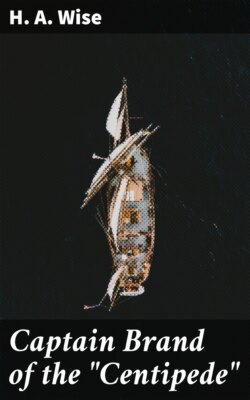Читать книгу Captain Brand of the "Centipede" - H. A. Wise - Страница 5
На сайте Литреса книга снята с продажи.
CHAPTER I.
SPREADING THE STRANDS.
ОглавлениеTable of Contents
| “Shout three times three, like Ocean’s surges, Join, brothers, join, the toast with me; Here’s to the wind of life, which urges The ship with swelling waves o’er sea!” “Masters, I can not spin a yarn Twice laid with words of silken stuff. A fact’s a fact; and ye may larn The rights o’ this, though wild and rough My words may loom. ’Tis your consarn, Not mine, to understand. Enough––” |
It was in the year of our Lord eighteen hundred and five, and in the River Garonne, where a large, wholesome merchant brig lay placidly on the broad and shining water. The fair city of Bordeaux, with its great mass of yellow-tinted buildings, towers, and churches, rose from the river’s banks, and the din and bustle of the great mart came faintly to the ear. The sails of the brig were loosed, the crew were hauling home the sheets and hoisting the top-sails with the clear, hearty songs of English sailors, while the anchor was under foot and the cable rubbing with a taut strain against the vessel’s bluff bows. At the gangway stood a large, handsome seaman, bronzed by the sun and winds of about half a century, dressed in a square-cut blue jacket and loose trowsers, talking to the pilot––a brown little Frenchman, in coarse serge raiment and large, clumsy sabots. The conversation between them was carried on partly by signs, for, in answer to the pilot, the other threw his stalwart arm aloft toward the folds of the spreading canvas, and nodded his head.
“Fort bien! vite donc! mon Capitaine,” said the pilot; “the tide is on the ebb; let us go. Up anchor!”
“Ay, pilot!” replied the captain, pulling out his watch; “in ten 6 minutes. The ladies, you know, must have time to say ‘good-by.’ Isn’t it so, my pilot?”
The gallant little Frenchman smiled in acquiescence, and, taking off his glazed hat with the air of a courtier, said, “Pardieu! certainly; why not? Jean Marie would lose his pilotage rather than hurry a lady.”
Going aft to the raised cabin on the quarter-deck, the captain softly opened the starboard door, and looking in, said, in a kindly tone,
“It is time to part, my friends; the pilot says we are losing the strength of the tide, so we must kiss and be off.”
Two lovely women were sitting, hand clasped in hand, on the sofa of the transom. You saw they were sisters of nearly the same age, and a little boy and girl tumbling about their knees showed they were mothers––young mothers too, for the soft, full, rounded forms of womanhood, with the flush of health and matronly pride tinged their cheeks, while masses of dark hair banded over their smooth brows and tearful eyes told the story at a glance. They rose together as the captain spoke.
“Adieu, chère Rosalie! we shall soon meet again, let us hope, never more to part.”
“Adieu, Nathalie! adieu, dearest sister! adieu! adieu!”
The loving arms were twined around each other in the last embrace; the tears fell like gentle rain, but with smiles of hope and trustfulness they parted.
“Ay,” said the sturdy skipper, as he stood with eyes brimful of moisture regarding the sisters, “ay, trust me for bringing you together again. Well do I remember when you were little wee things, when I brought you to France after the earthquake in Jamaica; just like these little rogues here”––and he laid his brawny hands on the heads of the children, who clung to each other within the folds of their mothers’ dresses; “but never fear, my darlings,” he went on, “you will meet happily again. Ay, that you shall, if old Jacob Blunt be above land or water.”
A boat which was lying alongside the brig shoved off; the little boy, who had been left on board, was held high above the rail in the arms of a sturdy negro, while the mother stood beside him, waving her handkerchief to the boat as it pulled rapidly away toward the shore.
“Man the windlass, lads!” cried the captain. “Mister Binks, brace round the head-yards, and up with the jib as soon as the anchor’s a-weigh.”
The windlass clinked as the iron palls caught the strain of the cable, the anchor was wrenched from its oozy bed, the vessel’s head fell off, and, gathering way, she moved quietly down the River Garonne.
7
